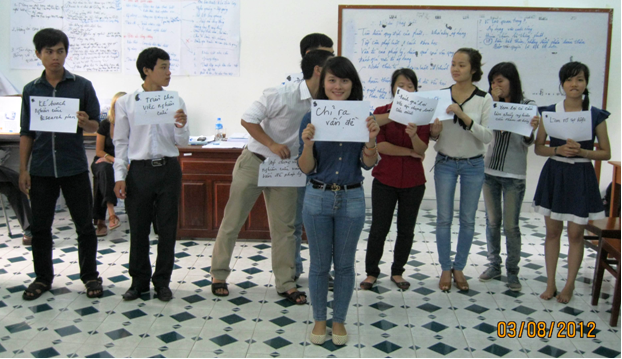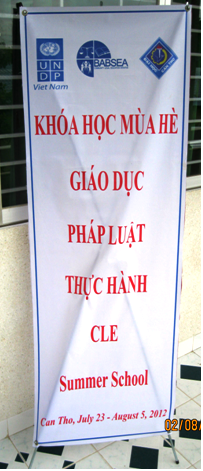by Richard Grimes, Director of Clinical Programmes, University of York Law School, UK, and Rebecca Parker, Pro-Bono Coordinator and Supervising Solicitor, The College of Law Legal Advice Centre, Birmingham, UK
 In late July and early August, a team of international experts travelled to Can Tho University in Viet Nam as part of the latest BABSEACLE Initiative. There, they conducted a successful CLE ‘Summer School’ and assisted in the design of the first credit-bearing CLE course for the Can Tho University (CTU) Law School.
In late July and early August, a team of international experts travelled to Can Tho University in Viet Nam as part of the latest BABSEACLE Initiative. There, they conducted a successful CLE ‘Summer School’ and assisted in the design of the first credit-bearing CLE course for the Can Tho University (CTU) Law School.
 The two-week ‘Summer School’ involved lecturers and students from universities across Viet Nam and was designed to introduce par-ticipants to the two principal concepts that underlie CLE’s ‘hands-on’ approach to teaching and learning.
The two-week ‘Summer School’ involved lecturers and students from universities across Viet Nam and was designed to introduce par-ticipants to the two principal concepts that underlie CLE’s ‘hands-on’ approach to teaching and learning.
Firstly, CLE is premised on the educational theory that students experience an enhanced level of understanding when they are actively involved in their learning, rather than passive recipients of knowledge, as offered by traditional lectures. Secondly, law schools and faculties possess a great capacity to contribute to clinic legal work and thereby improve the ability of marginalised communities to access legal services and, ultimately, justice.
BABSEACLE’s ‘Summer School’ began each morning with demonstrations of various interactive learning models used in CLE classrooms. The Vietnamese lecturers participated in a simulated CLE class as “students”. In the afternoons, two groups of lecturers practised teaching with the morning’s methods, while the others kept their “student hats” on. At the end of each day, there was a peer-feedback and self-reflection session. In the second week, Vietnamese law students joined the afternoon classes. Judging by the enthusiasm and hard work put in by all participants, the CLE ‘Summer School’ was a great success in both teaching and learning.
While it is one thing to coach a new way of teaching and learning, it is quite another to see those ideas become a reality. After CLE ‘Summer School’ ended, we were asked to join the team at Can Tho University charged with designing a new credit-bearing CLE course for their law students. In addition to providing the teaching staff with the tools of CLE methods and the students with the opportunity to put legal theories into practice, the program was required to meet the standards of higher education in Viet Nam, the internal rules of CTU and the conditions of admission to the legal profession.
Case Study Course
The team concluded that in order to build the necessary experience and confidence in the CLE learning models, the course should be based on a range of simulated case studies that represented the type of legal problems that the students might encounter in a legal clinic, such as family, housing, inheritance, and other civil and criminal issues. Spread over 13 weeks and guided by their teachers, law students will simulate inter- terviews, obtain facts, conduct research and draft accurate and realistic advice for their fictional clients as if they were faced with a real case. As this CLE course is also intended to provide a platform for the Law School to develop an in-house legal clinic, these simulated case studies are aimed at providing a workable framework for use in live-client clinical work. Subject to evaluation, the Law School has expressed a willingness to pilot the program and share the design of the new CLE course with other law schools in Viet Nam, to help develop a nationwide CLE initiative.
The CTU program is planned for January 2013, and hopefully, the accredited CLE course will provide a locally and regionally adaptable blueprint for others. BABSEACLE’s partner universities across the region are working toward accreditation for the CLE approach to legal education to simultaneously aid student learning and facilitate access to justice and legal services for communities in need.
